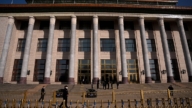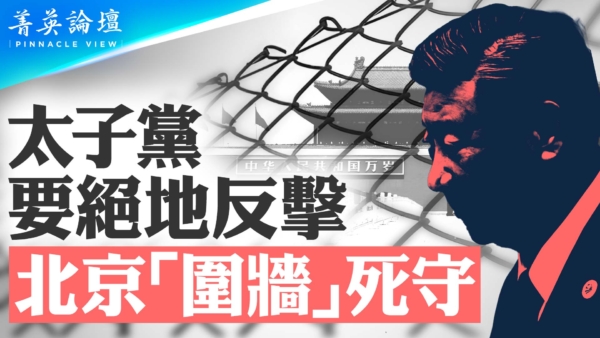【新唐人2015年02月02日訊】中共商務部最近公布了《外國投資法(草案徵求意見稿)》,規定實際控制人的國籍決定企業是否為外資企業,而外資企業不得投資禁止實施目錄列明的領域。專家指出,實際控股標準虛無縹緲,等同兒戲。
1月19號,中共商務部公布了《外國投資法(草案徵求意見稿)》,試圖取代實施了將近30年的外資三法,也就是外資企業法、中外合資經營企業法和中外合作經營企業法。
中國原來的法律對外資企業的認定標準,是根據股東的國籍來認定企業的國籍。
新的外國投資法草案,對外國投資者的定義中採取「實際控制」標準,也就是說,實際控制人的國籍決定企業是否為外資企業,繼而認定是否為外國投資者。
草案第11條第2款規定:受外國投資者控制的境內企業,視同外國投資者。第18條規定:認定控制某一企業的標準,除了具有股權、董事會股東會控制權外,也包括通過協議或信託方式對該企業的經營、財務、人事或技術等施加決定性影響。
中國資深法學專家趙遠明:「實際控制權實際上在法律上是虛無縹緲的,日常經營靠總經理,靠CEO。開一個董事會,董事長能給他踢跑了,你說誰控制,換一個中國國籍的就是中資企業了,那你這企業一年能夠變好幾次,小孩的遊戲似的。」
外國投資法草案出來後,由於涉及對外資監管法律體系的變革,引起了中外企業的關注。外界普遍認為互聯網企業將受到較大衝擊。
在過去的十幾年中,中國民營企業為了在海外上市融資,同時規避中共當局在互聯網、電信和教育等政治敏感行業對外商投資的限制,採取了一種叫做VIE的可變利益實體模式。
VIE結構,通常是指境外特殊目的公司,通過它在中國的全資子公司,以協議控制的方式控制一家內資公司,從而實現境外特殊目的公司對內資公司的並表,然後境外特殊目的公司再在境外融資或上市。
2000年,新浪作為第一個使用VIE模式的公司,成功實現美國上市後,搜狐、百度、包括阿里巴巴,以及傳媒、教育、消費、廣電類的企業也紛紛採納這一模式。據不完全統計,從2000年至去年6月,通過VIE模式實現境外上市的內資企業約有250家。
到目前為止,中共當局對VIE結構基本都是睜一眼閉一眼,因而VIE結構一直被稱為灰色地帶。
美國《中國事務》總編輯伍凡:「最大的原因引起這個改變的,就是以阿里巴巴為代表的網路公司到外國去投資,引起外國有興趣,它要投入進來,網路在中國又是一個非常忌諱的一個行業,網路裡面很多內容不准你外國人投資的,所以這裡面就產生了很大的衝突。」
不過,新的外國投資法草案規定,外國投資者不準投資禁止實施目錄列明的領域。
大陸《新浪網》評論說,雖然現行法律並未禁止VIE,但VIE的合法性,對於實現境外上市的內資企業來說,依然是頭上的一把利劍。
北京東易律師事務所郭立軍律師對媒體表示,如果VIE模式被政府認為違法,採用VIE模式的內資企業,將會被認定為不具備按內資企業申請各種牌照的資格。同時會使得企業面臨非法經營的法律風險。如果協議出現問題,海外上市的殼公司就會一文不值。
《華爾街日報》報導說,10多年來,VIE結構的法外身份讓很多外國投資者擔心,他們害怕一旦北京開始管束這種企業結構,或在中國境內的經營實體決定不再履行與境外控股公司間的合約,外商的利益可能就得不到保護。
投資專家認為,每當有關對VIE的某種擔憂出現時,很多在紐約上市的中國企業股價就會受挫。如果中國法律將VIE結構,重新認定為外國投資者對華投資的合法途徑,進行此類投資的難度就會小很多。
採訪編輯/劉惠 後製/李智遠
Is The Foreign Investment Draft Legislation a Child’s Game?
The Chinese Communist Party (CCP) Ministry of Commerce
issued draft legislation on “Foreign Investment (Draft for
Comment, the Draft)" for public comment. It focuses on
who has control of the company.
The ‘control’ of the company determines
if the company is foreign.
Foreign companies are barred from operating
in restricted sectors.
Experts criticize that the standard of ‘control’
is like children playing.
The Draft from Ministry of Commerce is to replace
the current three foreign investment laws:
Law on Wholly Foreign-owned Enterprises;
Law on Sino-foreign Equity Joint Ventures; and,
Law on Sino-foreign Cooperative Joint Ventures.
The current laws deems business as foreign
based on its foreign shareholders.
The Draft, however, focuses on who has the actual control
of the company.
The nationality of the controller determines if the company
is a foreign business or a foreign investment.
Draft article 11, paragraph states “Domestic business
controlled by foreign investors is a foreign investment".
Draft article 18 states, “The definition of ‘control’ is the
equity shareholder, board of directors, and influential
decisionmakers through agreement or trust on the
corporate management, finance, personnel, or technologies.
Chinese legal expert Zhao Yuanming: “The actual control
Is an illusion in law.
Daily operations are done by the General Manager, the CEO.
But they can be kicked out in one meeting by the Chairman
of the board. So, who’s controlling?
One Chinese manager will make it into a Chinese owned
business. It can be changed multiple times a year.
It’s like a child’s game."
The Draft has caused concerns as it could bring changes
to the way the CCP regulates foreign investment.
The internet business, in particular, is expected
to be extremely heavily hit.
For more than a decade, Chinese businesses have adopted
the variable interest entity (VIE), to allow foreign investment
in sensitive industries such as the Internet, education and
telecommunication that typically forbid foreign investment.
The VIE structure lets investors take stakes in offshore
holding companies that rely on contracts to control—
but not own—the Chinese entities that actually operate
the businesses, said the Wall Street Journal.
In 2000, Sina became the first company to use the VIE
structure and show up in the US market, followed by
Alibaba and media, education, commodity, and
entertainment industries.
Data showed that up to June last year, there were 250
companies which successfully adopted the VIE structure.
Until now, the Chinese government has largely turned
a blind eye to VIE’s, but some foreign investors worry
that their status remains unclear, added the WSJ.
Chinese Affairs magazine editor Chris Wu, “The reason for
this change is mainly because e-commerce giant, Alibaba,
invested overseas and attracted interested foreign investors.
But the internet is a very sensitive sector in China.
Foreigners are banned from participating.
That’s why conflict arises."
WSJ stated, it appears to say that VIEs will be deemed
to be foreign if foreign investors are in control,
meaning they may be barred from operating in
restricted sectors.
Sina commented that current laws did not ban the VIE.
However, the legal issue of the VIE could be a sword
for foreign shareholders of Chinese companies.
Beijing lawyer Guo Lijun told the media that if the CCP
considers the VIE illegal, Chinese companies with foreign
shareholders will have their registration revoked and
face the issue of illegal operations.
Should the negotiation fail, the overseas entity
will become worthless.
The VIE legal status has been unclear for foreign investors
for more than ten years.
It has been reported that Investors feel the lack of clarity on
the legalities mean they may not be protected if the CCP
changes the structure or if Chinese companies don’t agree
with being bound to the offshore holding companies.
Finance experts analyze that many Chinese businesses listed
on the NYSE trade at below market value in response to any
fears related to the status of the VIE structure.
Foreign investors will have a much easier time investing in
Chinese businesses if the CCP allows the VIE structure to
become legitimately recognized in Chinese law.
Interview & Edit/LiuHui Post-Production/Li Zhiyuan






























